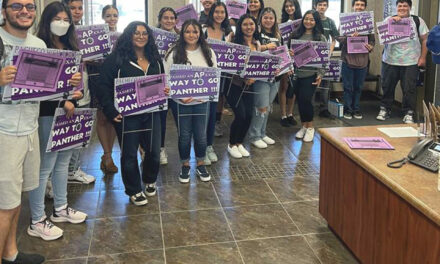During their senior year many high school students contemplate their options and consider what their life would be like after high school.
I’m a high school senior this year, and I’ve always known that college was the best option for me. I’ve always hated my physical education class, nearly felt as though my lungs were going to collapse every time I did cardio and knew that just the thought of having to run a mile every week was enough to make me vomit.
On the other hand, my friend Cheyene Rasmussen, a senior last year, always seemed determined to become a Marine. I remember she would walk into our fifth period AP calculus class and gleam about how excited she was to attend PE class that day.
Recently I reconnected with Cheyene after her graduation from Marine boot camp. I hadn’t seen her in a few months, so I looked forward to a chance to talk with her about her decision to become a Marine.
Cheyene explained, “I joined the Marines after high school because my dad served, and after he passed away I decided to follow in his footsteps.”
Cheyenne added that her decision came after a lot of thought. “When I first started high school,” she said, “I was considering the Marines, but I was mostly still set on college. I wanted to go to UCLA and study criminal justice.”
After high school she chose to become a Marine, and she has no regrets. “Even though boot camp was hard physically and mentally,” she said, “I had the rest of the platoon to support me.”
Cheyene told me she wants to make the military a career. “I plan on serving 20+ years in the Marines,” she said, “and then going into Homeland Security.”
Last year, Cheyene spent days and days talking to me about the Marines and trying to convince me to join, but I would not budge. Yet I respected her decision. Through her words and her actions, Cheyene seemed so passionate and articulate about her process of becoming a Marine.
She found so much joy as a senior in running until she could not feel her legs, exercising and yelling her lungs out at people. This seemed so novel to me.
Cheyene has always been so full of life, expressive of herself, ambitious and smart. She has always been selfless and inspiring. Even though she had a million things going on, she found time to tutor her peers at the Marine recruiting office so that they could pass the ASVAB and be able to enlist, as she was going to do.
Cheyene is both humble and bold , serious yet lighthearted. And she has always had her heart set on leaving this town and making something of herself.
When she was a senior, I felt her presence was so exhilarating that, although I sometimes hated my AP calculus class, I loved going to fifth period just to talk to her.
At her graduation, as my eyes filled with tears, I gave Cheyene one last hug before she went off to boot camp, knowing that I would have one more year at this high school without one of the best friends I’ve ever had.
As a senior this year, I’m reflecting on what faces me and my classmates soon. Let’s be honest, being a teenager and having to map out your life plan by your senior year is extremely stressful and overwhelming.
While some people know what their life calling is right off the bat, for others it may take some time and critical self-reflection through life experiences.
For thousands of young American men and women, serving in the military has always been an economically and socially appealing pathway, since military service can allow them to achieve many goals with lifelong benefits.
Serving in the military after high school, as I reflect on it, provides the perfect combination of having time and independence to find one’s footing and discover what purpose they are passionate about before embarking on a future career path. On top of this, the cost of college is at an all-time high.
Many high school graduates consider enlisting to give themselves a better chance at affording a postsecondary education. Entering the military may provide significant financial benefits for service members who go to college, since they are eligible for tuition assistance while in the reserves or on active duty.
All five military branches offer training programs to their members, which improve their service in the military and enhance career opportunities as a civilian.
However, even though joining the military provides a load of benefits for individuals, it takes a lot of time and dedication as it is extremely difficult both physically and mentally.
What did it take for Cheyene, for example, to become a Marine? Even though many kids think that joining the marines is “super fun,” the Marine Corps may not be right for everyone. Enlisting as a Marine consists of an extensive and daunting process.
Both enlisted and officer candidates must pass a criminal background check, and new recruits must pass the Initial Strength Test (IST) and the Armed Service Vocational Aptitude Battery (ASVAB).
As our recent conversation came to an end, Cheyene had a message for current high school students. “Please pay attention,” she said, “and actually try in school. The military isn’t just a last resort.”
I don’t know whether I will see her in a couple months or a couple years. All I do know I that many high school graduates choose the daunting pathway of joining the military, as Cheyene did.
Cheyene Rasmussen will always be a good friend of mine whose conversations I will cherish–a person of beaming individuality and aspiration and an inspiration to dream big and be passionate about life.


